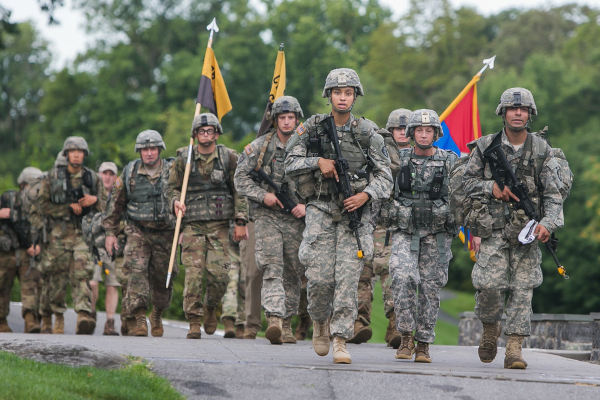There are few choices in life as significant and monumental as your decision to join the military.
While most service members prefer to enlist after high school or college, there are many that join later in life.
There are many advantages to enlisting early in the military, especially when it comes to meeting physical fitness and weight requirements.
However, joining the military at 30 also provides several benefits as you’ll be far more mature, disciplined, and mentally prepared.
Are you considering joining the military at 30?
Here’s how to do it…
Related Article – 10 Benefits of Joining the Military After High School
Which Branches of the Military Can I Join at 30?
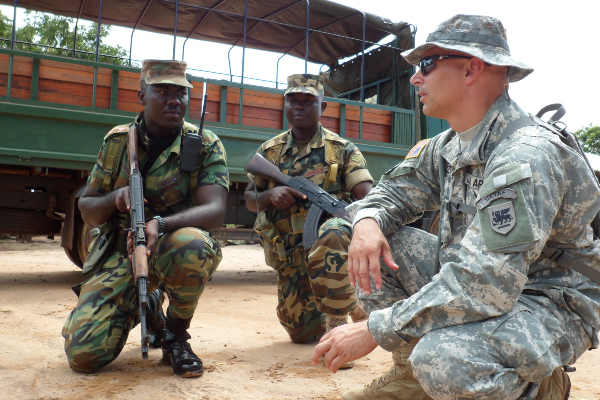
It is natural to think of most new recruits as young faces that are fresh out of high school or college.
However, some service members prefer to wait until later in life to serve their country.
Whether pursuing the military is a newly founded goal or something you have considered for years, there are pros and cons to joining in your 30s.
Members of the military that begin serving later in life are generally more mature and prepared for service.
In fact, you can join the military as late as the age of 42, though some branches have different requirements.
Military Branch Age Restrictions
Here are the age limits for active-duty service members:
- Air Force = 39 years old
- Army = 35 years old
- Coast Guard = 42 years old
- Marine Corps = 28 years old
- National Guard = 35 years old
- Navy = 41 years old
As you can see, the U.S. Army and Marine Corps have the strictest enlistment standards in relation to age.
Meanwhile, the U.S. Navy and Coast Guard accommodate the oldest members with a cutoff at the ages of 41 and 42, respectively.
The Air Force will surprisingly admit new recruits into their late 30s.
The Reserves offer the same age limits as the regular services do.
- Air Force Reserves = 39 years old
- Air National Guard = 39 years old
- Army Reserves = 35 years old
- Coast Guard Reserves = 40 years old
- Marine Corps Reserves = 28 years old
- Navy Reserves = 41 years old
Lastly, U.S. special forces have more strict age limits given the physical fitness demands of the organizations:
- Army Special Forces = 34 for new recruits, 36 for active duty
- Navy SEALs = 28 years old
If you fail to qualify for a particular branch or special forces because of age, you may request a waiver.
Those that apply for a waiver in a non-combat position (medical, legal, dental, etc.) are more likely to receive approval compared to combat roles.
Note that commissionable applicants in the medical and clergy fields can often join at a much older age. Navy chaplains, for example, can apply for a commission up to age 57.
For qualified physicians or other medical specialists with advanced degrees, you can often enter the military in your mid to late 40s, should you choose to serve.
Related Article – Military Age Limits: Do You Meet The Cutoff?
Benefits of Joining The Military At 30
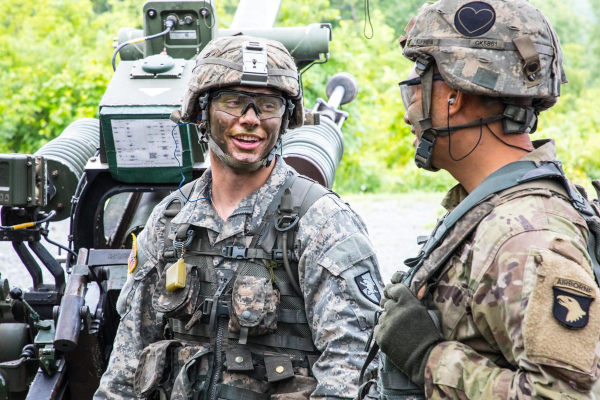
The military is more appropriate for younger people as most recruits enlist after graduating from high school or in their early 20s.
Nonetheless, some recruits arrive at boot camp in their 30s.
What are the benefits of joining the military at 30?
In general, older recruits pursue the military for the same benefits as someone half their age.
The U.S. Armed Forces is a terrific organization to consider joining if you want a steady paycheck, dependable benefits, as well as the opportunity to meet new people and see the world.
Moreover, the military is exceptional at building character and teaching discipline, which can help you in any avenue you pursue.
Service members train for a variety of professions and additional financial aid is available to those that want to pursue a college degree before or after serving their country.
These benefits are often more appreciated by service members in their 30s since they’ve already had real-world experience.
Consequently, joining the military at 30 may help you expand on job skills and training you already have, or introduce you to a brand new profession.
Additional Benefits
Service members with relevant education or job experience in the real world regularly receive military promotions, which equal better pay and benefits.
While pay rates are average compared to the private sector, military benefits are comprehensive and worthwhile.
The military can assist you and your family with healthcare, housing, food, and education.
Fathers and mothers often join the military in their 30s to help support their families.
The Military Spouse Preference Program is an outstanding offering for your significant other, while military child care and scholarship opportunities help cover critical expenses.
Lastly, joining the military at 30 is an enticing opportunity for those that may have not had the same opportunity fresh out of high school.
For example, all military occupations were finally opened to women in 2015 without restrictions. As a result, the U.S. Armed Forces is starting to see more women in their late 20s and early 30s join the military.
Those who may have not felt welcome when they graduated from high school or college may feel differently now that the military offers more career equality.
Downsides of Joining the Military at 30
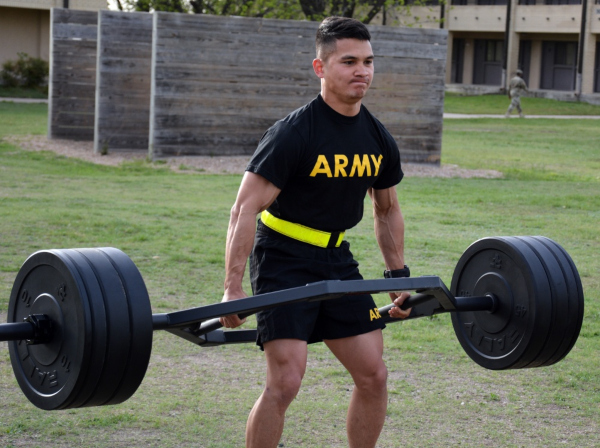
Life is a drag, which is why more and more adults look to radically change their life after being out in the real world for a considerable amount of time.
The idea of joining the military at 30 may sound tempting, but before you do anything rash, make sure you also consider the disadvantages.
The first and most obvious concern for older adults that join the military is physical fitness.
Military physical fitness standards are created more to accommodate younger adults in their 20s.
Consequently, you’ll need to train harder and spend time preparing for PFTs compared to younger recruits.
In fact, it may change your perspective when you find out that research says we’re stronger at 30 than we are at 20.
More specifically, women are at their strongest between the ages of 26 and 37, while men reach peak strength between the ages of 26 and 35.
So, it’s not impossible to meet military physical fitness standards in your 30s. For some portions of fitness testing, it may be easier.
The key difference is that you may have less time for fitness at 30 than you did at 20.
So, you’ll want to spend extra time preparing and recovering from fitness activities to avoid injury.
Just make sure you are prepared to put in a little extra time.
Additionally, older adults need to consider what they are leaving behind if they enlist.
Many adults in their 30s are already parents or have an established family.
Leaving Behind Family – The Ultimate Sacrifice
While serving in the military will entitle you to outstanding benefits that provide housing, food, and healthcare to your family, it also means that you’ll see them way less.
It can especially be hard on young parents who are going to miss out on several key life events because of service obligations.
Since most of the drawbacks are related to family, you need to make sure you have a supportive partner to help make the process easier.
Lastly, you’ll likely earn less working for the government compared to the private sector, which means many adults joining the military at 30 take a substantial pay cut.
Related Article: 20 Reasons to Join the Military (and 7 reasons not to)
Joining the Military with a College Degree

It benefits you to join the military with a college degree.
Why?
Recruits that already have a college degree have several advantages over recruits with just a high school diploma or GED.
First, you’ll likely begin your military career at a higher rank compared to recruits that lack a college degree.
A higher rank not only grants you more power and prestige but also guarantees a higher wage and benefits.
Additionally, recruits with a college degree are far more likely to advance in military rank quicker.
In fact, it is possible to begin your military career with the ranking of an officer with a college degree.
Joining the military with a college degree also gives you more control over your destiny.
For example, you generally qualify for more military occupations and can further your education through the GI Bill.
Joining the military at 30 is an exciting way to become a doctor or lawyer while having most or all of your education expenses covered by Uncle Sam.
Remember, you don’t have to stop with just a bachelor’s degree, as many enter service later in life to pursue a master’s degree or Ph.D.
The only real downside to joining the military with a college degree is you’ll likely earn less compared to people doing the same job in the civilian world.
However, free military housing, food, healthcare, and education aid help offset the lower wages.
Related Article – Joining The Military After College: How To Do It The “Right” Way
How to join the military at 30 years old?
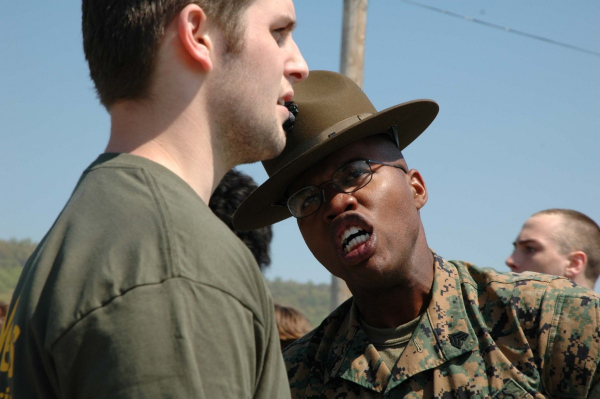
There are two ways to join the military at 30, with or without a college degree.
First, you need to make sure that you qualify for the military branch you seek to join based on age.
The age cutoff is far younger for active-duty members of the Army and Marine Corps compared to the Navy and Air Force.
Secondly, make sure that you meet all other eligibility criteria for the military branch.
Thirdly, you should consider meeting with a military recruiter before you get too deep into the process.
A military recruiter can help answer any questions or concerns, but make sure you aren’t pressured into making a decision at that appointment.
Considering enlisting in the U.S. Armed Forces takes time and feedback from family and friends, especially for older adults.
Steps to Joining the Military at 30
There are two ways for joining the military at 30.
You may enlist in a qualifying branch A) with or without a degree as an enlisted soldier or B) as an officer.
Recruits that already have a bachelor’s degree but still prefer to join as enlisted automatically start with the ranking of E-4, depending on the branch.
The starting salary for an E-4 with less than two years in service is about $2,500 per month.
However, you can earn a higher salary by considering joining the military at 30 as an officer.
The opportunity is only available to college graduates.
Additionally, you’ll need to make it through Officer Candidate School (Army). Depending on who you ask, OCS can be even harder than boot camp. At least, when it comes to academics and leadership skills.
However, joining the military at 30 as an officer provides one significant advantage — pay.
An O-1 officer with less than two years in service starts at a base salary of $3,637.20 per month compared to $2,503.50 for an E-4 recruit.
Enlisting in the Military
Here are the steps you need to complete to join the military at 30:
- Step One: Meet with a military recruiter to discuss eligibility and expectations.
- Step Two: Complete the Armed Services Vocational Aptitude Battery (ASVAB) exam.
- Third Step: Complete a medical exam at a Military Entrance Processing Station (MEPS). You will also need to pass a physical fitness test.
- Step Four: Finalize your service term agreement and get a reporting date for boot camp.
- Step Five: Complete basic training and specialty training before receiving your first assignment.
Related Article: 41 Questions To Ask A Military Recruiter
Conclusion
You are making a mistake if you think it’s too late to enlist in the military.
Most military branches allow citizens to join into their 30s and early 40s.
Therefore, it’s not too late to make a major lifestyle change if you want to join the military at 30.
There are advantages and disadvantages to joining the military at 30, especially if you already have a spouse or family.
Nonetheless, serving the country is one of the most rewarding honors you can seek, and doing so later in life has additional significance.
Military benefits generally cater to families thanks to housing, food, education, and healthcare assistance.
- Replacing Dog Tags: 6 Things You Need to Know - June 28, 2024
- Navy OAR Test Study Guide - June 24, 2024
- 10 Best Sniper Movies of all Time - June 20, 2024
Originally posted on December 12, 2020 @ 4:01 pm
Affiliate Disclosure: This post may contain affiliate links. If you click and purchase, I may receive a small commission at no extra cost to you. I only recommend products I have personally vetted. Learn more.
